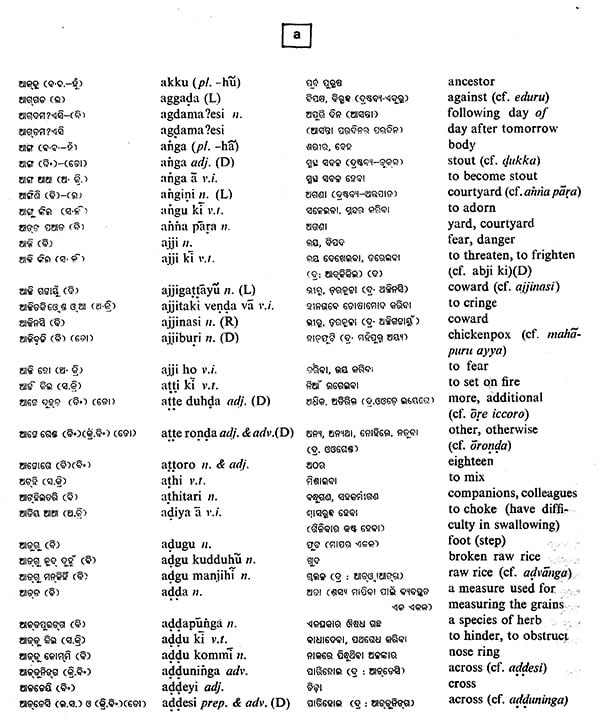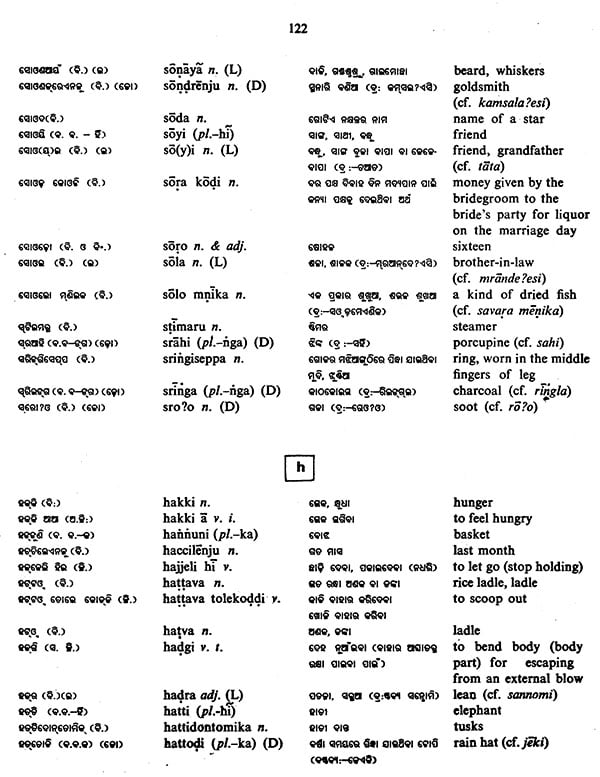
Kuvi-Oriya-English Dictionary (An Old Book)
Book Specification
| Item Code: | MZO613 |
| Author: | B. Ramakrishna Reddy, Joy Reddy and B.P. Mahapatra |
| Publisher: | Central Institute Of Indian Languages, Mysore |
| Language: | Kuvi, Oriya and English |
| Edition: | 1995 |
| ISBN: | 8173420254 |
| Pages: | 132 |
| Cover: | PAPERBACK |
| Other Details | 10.00 X 8.00 inch |
| Weight | 310 gm |
Book Description
The Central Institute of Indian Languages is concerned with the development of Indian languages. The development of Indian languages can take place by their use in new domains, which requires development of materials and methods of manpower for work in the areas of codification, standardisation and modernisation. The work of the Institute encompasses basic research, material production and inservice training. The Institute is also entrusted with the special responsibility of assisting the development of tribal and other .minor languages. .The work of these languages include preparation of grammar, dictionary and learning materials besides providing training to teachers in tribal schools in the use of tribal languages in a bilingual model of education.
The dictionary in any language is an important instrument for its codification and standardization. It is more so in the case of tribal languages with very recent literacy practices and with variations in language use, particularly in spelling. The dictionaries in tribal and minor languages therefore are an important step in their development. They are also a tool for learning language. The speakers of these languages have to learn the dominant language of the State and also to some extent the official languages of the Union. Therefore the dictionaries are in some cases quadrilingual and in most cases trilingual. The dictionary should also be useful for the speakers of the State language to learn the tribal language.
The entries of the tribal language are given in the script adapted for the language ‘following the spelling system developed for it. This is followed by phonemic transcription when the script is not Roman to guide pronunciation as well as to make the dictionaries usable to linguists.
There are special lexicographic problems in compiling a dictionary for pre-literate and neo-literate languages. The data are to be collected primarily from spoken sources and word boundaries are to be established by the linguist. The meanings are to be obtained not from the context of use of words but from the statement of speakers. These have their own limitations. It is hoped that this dictionary will initiate interest in further lexical studies of the language to help to enlarge and enrich it.
The dictionary is not only a description of the lexicon of a language but is also a description of the culture of its speakers codified in the words. The tribal language dictionaries are particularly useful from this point of view for culture studies, though cultural information is kept to the minimum in this dictionary, which is primarily meant for linguistic and pedagogical purposes.
A major objective of the Institute is to preserve and promote multilingualism in the country. We hope that codification and teaching of the tribal and other minor languages will contribute towards achieving this objective. We hope that not only the tribals become bilingual, which they normally are, but also non tribals become bilinguals by learning the tribal language for better communication and understanding of each other.









